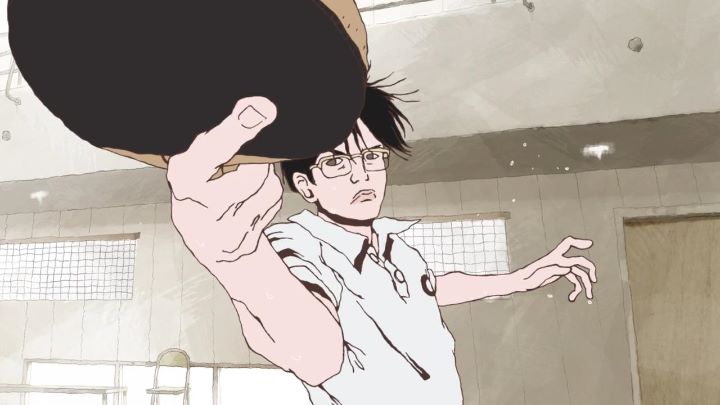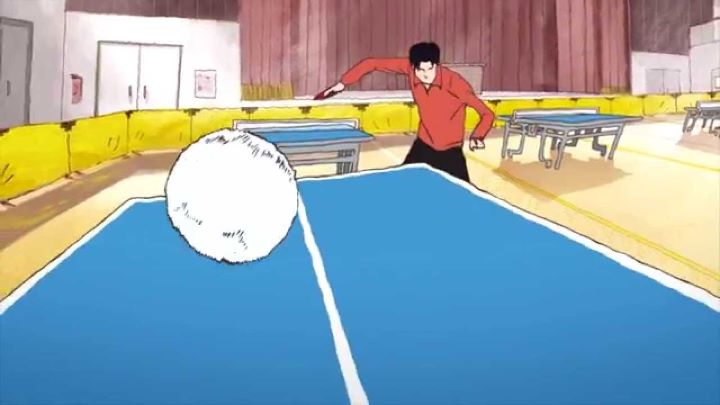








Anime happens to be really good at suspense and drama, best seen in situations involving competitions. My favourite parts of most Shonen-action series are usually the "tournament" arcs, where characters both good and bad compete against each other over dozens of episodes in a structured contest to be "the best." There may be no actual stakes, but it has all the fun of following sports like Football or Baseball on television, except you already know the backstory of all the partifipants. It would make sense that "sports" would be an easy genre for anime, and yet the genre famously has struggled, not being financially successful with such consistency that studios rarely even attempt to make one. For that matter, there are few examples of it even in Hollywood films, so perhaps the excitement of watching a pre-scripted match isn't as engaging as one would think.But there do exist sports anime, and surprisingly, one of the best ones is centered around Ping Pong. 2014's "Ping Pong the Animation" actually has some pedigree, being based on a hit manga from 1996, one that already had a live-action Japanese film adaptation (which I had already heard of, in an old advertisement of an American DVD by Viz Media). "Ping Pong the Animation" would also be directed by Masaaki Yuasa, a unique visionary in the industry, the last series he would direct before opening his own studio with successful films and series years later. Yuasa is careful to respect the original art style of the manga instead of trying to update it with more conventional anime designs, and enhances it with his ambitious and kinetic animation. The visuals are the most memorable part of the show, but even without that, "Ping Pong"'s story is impressively poetic in its simplicity and effectiveness. It's good the story excels, because those visuals will divide most audiences. Yuasa already has a reputation for a style of animation and preference for character designs that look like they came from a Tex Avery-cartoon, sometimes referenced by fans as "brilliant" and by others as "ugly." For "Ping Pong," the character designs look like contour pencil scribbles, practically unfinished. There's a purity to it, and it is certainly distinct, and for these reasons I hold its style in high regard, even though I am fully aware most viewers will not care for it. But even the simplest visual style can be impressive when it moves, and the animation is strong. In most scenes, it's still and limited, but character poses and camera angles are constantly changing to keep the frame interesting. And when it does move, usually during ping pong matches, it moves with great detail applied to the arms, the feet, the paddle and the ball. Table tennis has never looked so exciting. One only needs to watch the opening sequence for each episode, where the camera takes the perspective of a ball in play with fading-in-and-out characters hitting it, drawn and animated in a variety of styles, as if the animators were testing how to apply the style before beginning the show: there is a great love of animation at work here.Back to the story: as I said, it is deceptively simple. It's told as a coming of age story between Peco and Smile, two Japanese teenagers, best friends with opposite personalities. Each are talented ping pong players for their school team, considered the best in town, number 1 and 2. As they prepare for international competition, Peco arrogantly challenges a visiting star player from China, and in his defeat (the first time he's been defeated in years), he quits and leaves ping pong, seamingly for good. Smile, on the other hand, is quiet and serious, something his coach believes he can control and mold to be a top player, and therefore devotes his attention to his training, making the sport take over Smile's life and mentality. It's bizarre to see the story from two different perspectives, one from a player that drops out for the majority of the series, but the relationship between the two friends is complex, and it builds to a satisfying conclusion when the two ultimately and inevitably face each other in the final matches.  Beyond Peco and Smile, the other competitors are rendered with detailed backstories. Extra credit has to be given both the Japanese and English dubs, who voice the Japanese players in the native language of their audience, but voice international characters in their expected language. The Chinese player speaks Cantonese, for example, much to the confusion of Japanese people around him. Each character has their own motivations for playing, be it for fun, glory, profit or honor, each with complciations in their own lives. It's devistating when they each lose, for only one can win at the end. This is what good sports-stories are about. Commonly, they are all about this, but one only needs to watch "Ping Pong" to see it done to perfection.The art style might be off-putting, and the story might seem slow if you aren't fully invested, and for these reasons I honestly can't say for certain that everyone would love it. But I personally do love it, and consider "Ping Pong the Animation" to be a great achievement in animation and storytelling. If someone doesn't understand how sports-anime can be any good, this is the test I would give them.
Beyond Peco and Smile, the other competitors are rendered with detailed backstories. Extra credit has to be given both the Japanese and English dubs, who voice the Japanese players in the native language of their audience, but voice international characters in their expected language. The Chinese player speaks Cantonese, for example, much to the confusion of Japanese people around him. Each character has their own motivations for playing, be it for fun, glory, profit or honor, each with complciations in their own lives. It's devistating when they each lose, for only one can win at the end. This is what good sports-stories are about. Commonly, they are all about this, but one only needs to watch "Ping Pong" to see it done to perfection.The art style might be off-putting, and the story might seem slow if you aren't fully invested, and for these reasons I honestly can't say for certain that everyone would love it. But I personally do love it, and consider "Ping Pong the Animation" to be a great achievement in animation and storytelling. If someone doesn't understand how sports-anime can be any good, this is the test I would give them.